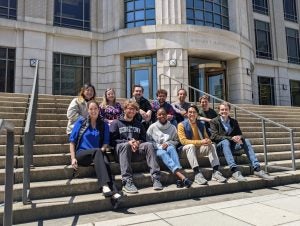Georgetown’s Environmental Law & Justice Clinic (“ELJC” or the “Clinic”) conducts public interest legal work on behalf of underserved clients in the areas of environmental justice, pollution control, natural resources and wildlife, and climate. The Clinic is an immersive and multi-modal experience, exposing students to the broad range of work in which environmental attorneys engage. We teach students key lawyering and advocacy skills through work on live cases that are excellent learning vehicles.

Our case load involves a mix of litigation matters, regulatory work, and other advisory projects. We select cases of national importance and/or local necessity in which we can protect and promote the health of marginalized communities, and the health of wild places and resources. The ELJC advocates on behalf of groups ranging in size from small community groups to tribes to large environmental or public justice organizations.
The ELJC aims to develop three core areas of competency, which can be translated to multiple practice areas or career paths:
- the skills to engage with clients, identify client interests, and effectively advocate for client goals in service of social justice;
- the habits relevant to professional practice such as individual and collaborative problem solving, planning and task sequencing, self-evaluation and reflection, and identification of ethical considerations; and
- an understanding of the foundations of environmental law and broader administrative legal practice by working on live cases.
The students, most of whom are in their third year of law school, work in the clinic full time and receive credit for an entire semester of law school work. They work on projects under the supervision of an environmental clinical fellow and faculty member, and participate in weekly seminars. Our seminars explore issues of federal administrative and litigation practice, various substantive fields of law, community engagement, issues of professional responsibility, and more. Students also lead their own project meetings in which they can present an issue that has arisen in their matter to their fellow students and supervisors for feedback, or to discuss a learning moment.
